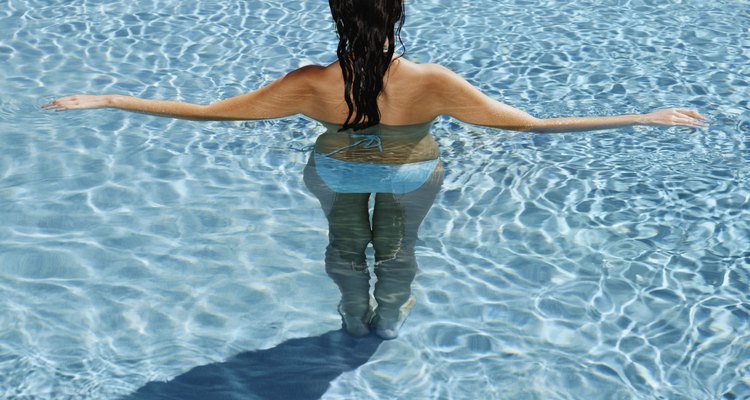
Dave & Les Jacobs/Blend Images/Getty Images
Fun in the sun turns ugly when reddened, sunburned skin meets chlorinated water. Chlorine treated pools sometimes irritate sensitive swimmer's skin, and sunburned skin is especially vulnerable. The Centers for Disease Control and Prevention warn that damaging UV, or ultraviolet, rays have the potential to damage skin even on cloudy or cool days. Although avoiding sun damage by wearing long sleeve clothing, hats and sunglasses is not practical in the pool, using a sunscreen lotion with a sun protective factor of 15 or higher, applied at least 15 minutes before going outside, helps.
Chlorine Function
Chlorine disinfects pool water and keeps swimmers safe from infection and disease. Without disinfection, pool water turns cloudy, develops algae and existing bacteria multiply. People bring infectious agents with them into the pool, and the risk increases with the number of people using the facility, says the CDC.When the chlorine meets contaminants, such as ammonia from urine in the water, it breaks down and neutralizes the ammonia. Chlorine also interacts with organic compounds such as human and animal waste to eliminate health threats.
Sunburn Effects
Sunburns and the effects of prolonged sun exposure damage the outer layer of the skin. Pale or light skin turns red after over-exposure to sunlight. Irritation, swelling and later sloughing off of dead skin occurs. Eventually, the body produces some melanin in reaction to the damage, and light skin tans. Some people, such as red heads, never tan and always burn. Others burn on excess exposure, only to turn tan later. Both acute and chronic exposure to the sun dries out the skin and leads to wrinkling and creasing of the skin, and potentially, different types of skin cancers, according to the CDC.
Chlorine Effects
Chlorine is a safeguard and an irritant as well. The chlorine in a pool disinfects the germs swimmers encounter in the water, and in the process, it creates byproducts that cause swimmers distress. Chloramine compounds are the culprits for the intense smell of some chlorinated pools, as the red eyes and runny noses of its users. In addition, chlorine sanitation sometimes causes itchy and dry skin. Under-hydrated, chafed skin is more vulnerable to damage from sun exposure, so frequent pool users might feel the sun on their skin before non-swimmers do, according to "Swimmer," a publication of U.S. Master Swimming.
Interaction
Chlorine does not increase the risk of sunburn, nor does it create an unusual hazard to people swimming with sunburned skin. Rather, it further dries out already irritated and inflamed skin, accentuating existing discomfort. Infection is not a problem, though, as the proper chlorination of pool-water minimizes the risk. People who choose to bathe outside with existing sunburns and further expose skin to UV rays might cause long-term damage to their health, the CDC says.
Prevention/Solution
Avoid sun exposure, especially at pools between 10 a.m. and 4 p.m. during daylight savings time, and between 9 a.m. and 3 p.m. standard time, when the CDC says that UV rays are most intense. Apply a sunscreen and reapply often when you go in the water. Wash off thoroughly after swimming in chlorinated pools, using specialized shampoos that help to eliminate chlorine on skin. Apply generous amounts of moisturizer to dry skin, but avoid using any scented products on inflamed or cracked skin. Chlorine further dries out sun-damaged and irritable skin, so staying away from the pool for a day or two is a good idea.
Related Articles

Skin Problems Caused by Swimming Pool ...
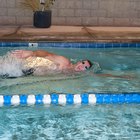
Do Swimmers Have More Acne Breakouts?
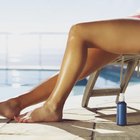
Pros & Cons of Spray-on Tans

What Chemicals in a Swimming Pool Turns ...

Is It Better to Wash Your Face With Hot ...

The Disadvantages of Deodorants

Are There Any Harmful Ingredients in ...

Why Do Swimmers Wear Caps?

Levels of Polarized Sunglasses
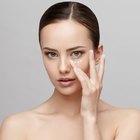
Hydroquinone & Dark Circles

Health Risks of Marble Dust

How Long After Shaving Do You Develop ...
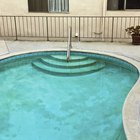
Swimming Pool Algae Problems

The Effects of Inhaling Air Dusters

How to Prevent Pock Holes From ...

How to Make Your Mystic Tan Last Longer

How to Keep Your Tribal Tattoo Black

Beaches Near Greenville, North Carolina

Can Tri-Luma Be Used to Fade Acne Scars?

Rash Guard for Swimming
References
Writer Bio
Barrett Barlowe is an award-winning writer and artist specializing in fitness, health, real estate, fine arts, and home and gardening. She is a former professional cook as well as a digital and traditional artist with many major film credits. Barlowe holds a Bachelor of Arts in English and French and a Master of Fine Arts in film animation.
Photo Credits
Dave & Les Jacobs/Blend Images/Getty Images